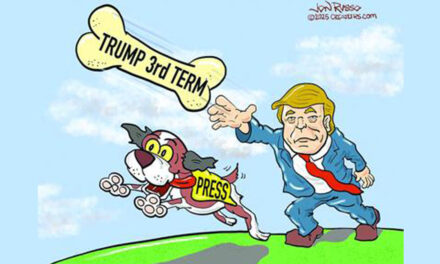
HORIST: Democrats deserve ‘Pinocchios’ for ‘bullcrap’ claims about the tax bill
Things got heated during a hearing of the Senate Finance Committee when the very liberal Senator from Ohio, Sherrod Brown, advanced the specious political talking point that the Republicans were working for the rich in developing the tax reform bill. The sartorial and usually calm committee Chairman Orrin Hatch, had enough of what he referred to as “bullcrap.” In looking over the facts of the legislation, Hatch’s rebuke of Brown was well deserved.
The Democrats are in lockstep opposition to the legislation regardless of any of the provisions. They oppose the House version. They oppose the Senate version. They pre-oppose amendments that may be part of the yet unfinalized legislation as it moves through Congress.
In their opposition, Democrats like Brown, and their echoes in the elitist eastern media bubble, totally misrepresent what the legislation will do. Their claims that the middle class will not realize tax cuts is so bogus that even the Washington Post awarded Senate Minority Leader Chuck Schumer a couple of well deserved “Pinocchios” for telling such a whopper.
What we do know is that the current tax code is not good. It is too complicated, is weighted down with too many loopholes for the privileged few, confiscates too much of the working American’s money and inhibits job creation and economic growth. It is the creature of the special interests, by the special interests and for the special interests. It has survived these many years because those special interests unite in opposition to any change that will diminish or eliminate their special advantages. If that thinking prevails, the GOP will fail and the nation will continue to limp along with a system that most Americans hate – and dynamic economic growth and job creation will be put off for another time.
Socialist Senator Bernie Sanders says that the tax legislation is just a way for Republicans to pay off their billionaire donors, and he never fails to mention the Walton family and the Koch brothers. Sanders hypocrisy is palpable. He fails to mention that of the top ten billionaires in the country eight are Democrats with a combined net worth in excess of half a trillion dollars. They represent 20 percent of the combined wealth of all the other billionaires on Forbes Fortunate 400 list. This includes such big-time Democrat donors as Bill Gates, Warren Buffett and Mark Zuckerberg. By far the biggest political donor in American history is radical left-wing Democrat Tom Steyer. So, enough of the b.s. about the Republicans being the party of the super-rich.
When you look at the proposed tax rates in either the House or Senate bill it is clear that every American will get lower taxes. Where the Republican tax bill really helps the vast majority of the taxpayers is the increasing of the minimum tax level. An individual who did not have to pay taxes on the first $6000 of income in the past will now not pay taxes until the income reaches $12,000. For a husband and wife, it goes from $12,000 to $24,000. If they have kids, they get a doubling or tripling of the dependent deduction. Those with incomes between the old figure and the new figure will get a 100 percent reduction.
The primary target of Democrat wrath is the reduction in the corporate tax rate. The current 35 percent rate – the highest among industrial nations – prevents repatriation of trillions of dollars businesses maintain overseas to … yep, you guessed it … to avoid paying the high tax. That money can be used in the U.S. to expand operations, hire more people and increase wages. Even a number of Democrats see the justification for dropping the corporate rate.
The Sanders’ Democrats claim that the corporations will do no such things. They predict that the business will just sit on the money. Businesses never just sit on the money. The money that companies hold as cash reserves is not piled up in vaults. It is invested, producing economic benefits.
Some of the money could be distributed to stockholders. That, too, is a general benefit to average workers, retirees and the economy in general. Stockholders are not a bunch of billionaires, but a huge number of the common folk. All those retirement funds are most often invested in stocks. If you are invested in a retirement fund, like a 401k or IRA, you are one of those stockholders.
The reason most of the repatriated foreign money will go into expansion and jobs is because that is what businesses are created to do. Top management has a legal fiduciary responsibility to maximize the return to investors. In addition to serving the interest of the stockholders, the pressure of competition requires businesses to increase their market share. Meeting the competition requires growth, and growth requires profits to reinvest and to hire more employees.
There is another inconvenient fact regarding corporate taxes that Democrats have long ignored. In a sense, it is not possible to tax a corporation. They pass taxes on to the consumer in the form of price increases. When you hire a lawyer or buy a shirt, you the consumer pays all those taxes imposed on the business by governments at every level.
If you buy a shirt from the XYZ Company, in that price are all the expenses and overhead of the business, including all the taxes they paid. If the store is renting space from the mall, the rent includes the owner’s taxes – and you also pay for that since the rent is just another pass through expense.
Since taxes, like any other business expense, adds to the cost of goods and services, they are essentially a hidden tax on the consumer. Even worse. Business taxes are regressive in that the price increases they generate hit hardest on the folks with the lowest incomes.
Democrats would like people to think they are sticking it to those hated billionaires, but when they tax corporations they are hitting you and me in the old pocketbook. We all understand that gasoline and cigarette prices are high because of all the taxes. Why do we have a problem understanding that simple truth when it comes to all the other business taxes?
Some Republicans are concerned about the tax policy as it is applied to traditional c-corp businesses, which are taxed on the corporate rate, and small but ubiquitous s-corps, in which the profits from the business is kicked over to the personal return of the owner and taxed according to his or her personal tax bracket. If you were in the proposed top 39 percent tax bracket and you ran an s-corp, your tax on the income derived would be 39 percent rather than the proposed 20 percent.
That is not as unfair as it may seem. In an s-corp, what you take out is a form of wages – personal income. In a c-corp, the wages paid are also subject to taxation according to the bracket of the employee. The difference is that c-corps produce after wage profits, which are distributed to stockholders and subjected to a different tax treatment.
If the tax differential between s-corps and c-corps was the only consideration there would be no s-corps. S-corps actually have a number of economic advantages over c-corps. That is why those who can qualify for s-corp status usually take advantage of it. (This Author ran an s-corp for more than 40 years.) Even so, the Republicans in Congress are looking how the legislation might be tweaked to provide even more benefits for the s-corp, which constitute the lion’s share of small businesses.
Perhaps the most politically difficult changes in creating a simpler and fairer tax code involve the deductions for state and local taxes, mortgage interest and charitable giving. These tend to be popular far beyond the number of taxpayers who actually benefit from them. The deduction of state and local taxes is unfair on the surface. It gives bigger deductions to people who live in tax and spend states, such as New York, California and Illinois. It rewards irresponsible fiscal policy.
The majority of taxpayers are not real estate owners so the mortgage interest deduction is not a universal benefit. It could be argued that the tax code is unfair to renters who pay the owner’s taxes and mortgage interest as part of the monthly rent bill, while the owner gets the benefit of the deduction.
The elimination of the tax, mortgage and charitable contribution deductions are more than offset by the significant drop in the bracket rates, increase in the standard deduction and higher deductions for dependents.
Democrats oppose the elimination of the estate (death) tax with specious arguments that sound like something from the game of Monopoly. They suggest that it is some special benefit for the super rich in which piles of cash are being handed down to their heirs. In fact, the estate tax mostly harms the many small and medium-size businesses in which the assets are not gobs cash but farmland, factories, small retail stores, equipment and inventories. These businesses may provide a modest income for the owners, but not masses of money. It is because of this lack of money that the heirs cannot afford to pay the taxes levied on the real estate, equipment and inventory. They cannot afford to keep the business operating. Not only do they lose their family business, but their employees lose their jobs. The losses roll out to the vendors and contractors. Since the estates in question have already been taxed at least once, the so-called death tax is a form of double taxation.
Perhaps the most clever and controversial provision of the tax bill is the elimination of the Obamacare mandate. This does away with the provision that requires individuals to have health insurance or pay a penalty. It is a very unpopular provision, especially among the young who are already being disserved by the growing national debt.
When Democrats say that 13 million people will “lose” their insurance coverage, they are being a bit deceptive. No one is forced off of Obamacare. Any reduction in enrollees is because they choose to get off an insurance program with high premiums — and deductibles so high that they effectively do not provide coverage for basic medical needs.
There is some criticism about the corporate tax reduction being permanent while the personal reductions need to be re-legislated in ten years. This is not by intent but by necessity in dealing with the arcane rules of the Senate and the need to pass the bill with a simple majority. Suggestions that the Republicans are bamboozling the taxpayer is simply untrue.
So, what about the alleged $1.5 trillion-dollar addition to the national debt. The agencies who predict that use a static model. In other words, they do not account for the effects of economic growth. Just a one percent increase in economic growth will generate sufficient federal revenues to cover any debt producing deficits. A little over a year ago, the same agencies predicted that America was stuck with the Obama two percent growth rate. Today it is running over three percent. With sufficient tax cuts, it is not unreasonable to expect a four percent growth rate soon.
Finally, there is a significant psychological benefit to the new tax code. Some 70 to 80 percent of the taxpayers who take the standard deductions will be able to use a very simple postcard size tax form. Ironically, that is how I started paying taxes half a century ago – before the special interests complicated the process with a seemingly endless array of loopholes and special provisions.
As good as tax reform is good for all Americans, it is only half the story. We need, for both political and economic reasons, massive cuts in federal spending. But, that is a subject for a future commentary.
The Democrats have every reason to hope and pray that the tax bill fails. I am sure that even they know it will be very popular with the general public once they experience it in operation. And even worse, it will undermine their strategy of denying President Trump any credit for anything.
Larry Horist is a conservative activist with an extensive background in public policy and political issues. Clients of his consulting firm have included such conservative icons as Steve Forbes and Milton Friedman, and he has served as a consultant to the White House under Presidents Nixon and Reagan. He has testified as an expert witness before numerous legislative bodies, including the U. S. Congress and lectured at Harvard University, Northwestern University, Florida Atlantic University, Knox College and Hope College. An award winning debater, his insightful and sometimes controversial commentaries appear frequently on the editorial pages of newspapers across the nation. He can be reached at lph@thomasandjoyce.com.




























Frank and Mike covered the main points. Larry, of what use is backing someone's economic policy in part when the…
I agree Seth: NOT MAGA! heh, heh. perspective, it's a bootiful thing.
Not MAGA.
Yup, Larry, you got me although you really didn't have to be such a dick about it. I just read…
Larry, Before you open your mouth again (and continue to make yourself look foolish), I suggest you educate yourself on…